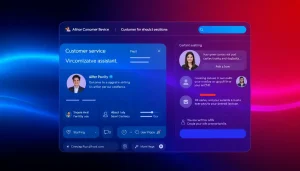Essential Job Research Tools to Boost Your Career Search Efficiency
Understanding Job Research Tools
Definition and Importance
In the contemporary job market, job research tools serve as the backbone for anyone navigating their career journey. These tools encompass a variety of resources designed to assist job seekers in finding, applying for, and securing positions that align with their skills and aspirations. From online job boards to networking platforms, these tools not only streamline the job search process but also provide critical insights into industry trends and job market demands.
The significance of leveraging job research tools cannot be overstated. They can empower job seekers to discover opportunities they may not have encountered otherwise. Utilizing such tools effectively can make the difference between landing a dream position and getting lost in a sea of application rejections.
Types of Job Research Tools Available
Job research tools can be categorized into several types, each serving unique purposes:
- Online Job Boards: Websites like Indeed, Glassdoor, and LinkedIn aggregate vast databases of job postings across various industries.
- Resume and Cover Letter Builders: Tools that provide formatting options, templates, and optimization features to ensure that resumes and cover letters meet current hiring standards.
- Networking Platforms: Platforms such as LinkedIn facilitate networking and direct connections with potential employers or industry professionals.
- Career Assessment Tools: Tools like O*NET OnLine help assess skills and match them with suitable careers.
- Job Alerts and Notifications: Configurable alerts that notify job seekers about new openings in their field of interest.
How These Tools Enhance Job Searches
Job research tools enhance the job search experience by enabling users to:
- Target Specific Opportunities: By filtering jobs based on preferred criteria such as location, salary, and type of employment, applicants can focus on the roles that best suit their needs.
- Optimize Application Materials: Accessing templates and effective format guidance ensures that application materials stand out and cater to best practices.
- Network Efficiently: Engaging with professionals in the industry can lead to valuable referrals and inside information about job openings.
- Analyze Job Market Trends: With access to industry reports and statistics, job seekers can align their skills with current job market demands.
Top Job Research Tools to Consider
Online Job Boards
Online job boards are essential in the job search landscape, providing an extensive array of job listings. Notable platforms include:
- Indeed: Famous for its user-friendly interface, Indeed aggregates job postings from thousands of websites, including company career pages and recruitment firms.
- LinkedIn: Serving as both a professional networking site and a job board, LinkedIn allows users to connect with others while searching for jobs tailored to their profiles.
- Glassdoor: In addition to job listings, Glassdoor provides company reviews and salary insights, offering a holistic view of potential employers.
- CareerBuilder: Known for its career resources, CareerBuilder aids in resume building and provides insights on labor market conditions.
Resume and Cover Letter Builders
Effective application materials are critical for job seekers, and resume and cover letter builders can make this task easier. Notable tools include:
- Canva: Offers visually appealing templates that allow users to create striking resumes and cover letters.
- Jobscan: This tool analyzes resumes against job descriptions, providing optimization tips for better alignment with keywords.
- ResumeGenius: Provides various templates and step-by-step guidance tailored to specific job types and career stages.
Networking Platforms
Networking is pivotal in job searching, and utilizing dedicated platforms can enhance connections and opportunities. Key platforms include:
- LinkedIn: As stated earlier, LinkedIn is an invaluable networking tool, enabling users to create connections with industry leaders and recruiters.
- Meetup: Focused on bringing individuals together based on interests, Meetup can lead to valuable networking opportunities.
- Fishbowl: This platform allows professionals to join discussions and gain insights about their industries from peers.
Maximizing Efficiency with Job Research Tools
Best Practices for Using Job Research Tools
To derive maximum benefit from job research tools, consider the following best practices:
- Be Specific: Use specific keywords related to your desired role to enhance search results.
- Set Up Job Alerts: Automating job alerts ensures that you don’t miss out on newly posted opportunities.
- Customize Applications: Tailor each resume and cover letter to fit the unique requirements of the job description.
- Network Actively: Reach out to connections monthly to stay top-of-mind when job opportunities arise.
Combining Tools for Optimal Results
Using a combination of job research tools can lead to a more strategic approach:
- Job Boards + Resume Builders: After finding desirable positions, customize your resume with builders for optimal chances of selection.
- Networking + Online Job Boards: Leverage connections on LinkedIn to get insights about jobs listed on various boards.
- Job Alerts + Tracking Tools: Utilize tracking tools to monitor the status of applications and combine that with job alerts for better management.
Tracking Job Applications Effectively
Maintaining a job application tracker can significantly improve your job search organization. You can create a personalized spreadsheet or leverage dedicated apps. Key details to track include:
- Job Title: Clearly note the title and company of the position applied for.
- Date Applied: Record when you submitted your application.
- Status: Monitor the current status of applications (e.g., applied, interviewed, rejected).
- Follow-up Dates: Schedule follow-up actions post-application to show your continued interest.
Advanced Job Search Strategies
Utilizing AI-Powered Job Research Tools
The advent of artificial intelligence has transformed the job search process. AI-powered tools enhance efficiency in several ways:
- Resume Optimization: AI tools like Zapier provide insights on keyword usage and formatting for applications.
- Interview Preparation: Platforms like HireVue use AI to simulate interviews and provide feedback.
- Skill Gap Identification: AI analytics can help identify skills needed for a desired job and recommend courses to bridge those gaps.
Setting Up Job Alerts and Notifications
Setting up job alerts can significantly enhance the efficiency of your job search. Most job boards allow you to configure alerts based on specific parameters such as:
- Keywords related to desired job roles or industries.
- Geographical preferences including city or state.
- Job type such as full-time, part-time, freelance, etc.
- Salary range if required.
Regularly updating these preferences ensures that you’re receiving the most relevant leads.
Leveraging Social Media for Job Opportunities
Social media is a powerhouse for job searching. Here are strategies to make the most of it:
- Build an Authentic Profile: Your social media profile should mirror your professional persona, especially on platforms like LinkedIn.
- Join Professional Groups: Engaging in professional groups can provide insight into job openings and industry trends.
- Share Your Work: Regularly post about your projects, achievements, and insights to enhance visibility among potential employers.
- Utilize Hashtags: On platforms like Twitter and Instagram, use job-related hashtags to discover and highlight opportunities.
Measuring Success with Job Research Tools
Evaluating Effectiveness of Your Job Research
To measure the success of your job search, consider these key performance indicators (KPIs):
- Application Response Rate: Measure how many applications lead to interviews.
- Interview-to-Offer Ratio: Track how many interviews you convert into job offers.
- Time Spent Searching: Evaluate how long you spend searching for jobs versus how many interviews or offers you receive.
- Networking Engagement: Keep track of how many new connections you make each month through networking activities.
Common Mistakes to Avoid
While utilizing job research tools, be cautious of the following pitfalls:
- Generic Applications: Submitting the same resume for every position can hurt your chances.
- Ignoring Networking: Over-reliance on job boards can lead to missed opportunities from personal connections.
- Failure to Follow Up: Neglecting to follow up after applications or interviews can create a negative impression.
Continuous Improvement Strategies
Continually refining your job search approach is vital to achieving success:
- Ask for Feedback: Seek constructive criticism on your resume and cover letters from mentors or professionals.
- Update Your Skills: Regularly take advantage of online courses to enhance skills relevant to your field.
- Reflect on Job Searches: Analyze what strategies yield the best results and adapt accordingly.













Post Comment